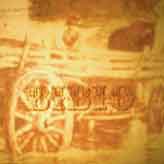Bibio, "Hand Cranked"
 Bibio's second release on Mush is a looped daydream of the English and Welsh countryside. It is a fluid affair with acoustic guitar, manipulated field recording, sparingly used fipple flutes and piano, tiny scraps of found sound, and—in a new departure for him—singing. As pleasingly blurred as a half-developed photograph or a landscape painting smudged by spots of rain, I only wish the elements of treatment and decay went further.
Bibio's second release on Mush is a looped daydream of the English and Welsh countryside. It is a fluid affair with acoustic guitar, manipulated field recording, sparingly used fipple flutes and piano, tiny scraps of found sound, and—in a new departure for him—singing. As pleasingly blurred as a half-developed photograph or a landscape painting smudged by spots of rain, I only wish the elements of treatment and decay went further.
Mush
Stephen Wilkinson adopted the name Bibio after the type of lure favored by his father on fly-fishing trips. Hand Cranked is also well named, as sections of the record feel as if they were somehow created by winding a mechanism to the required velocity, and keeping it spinning around that pace for a while. I don't think he actually uses a hurdy gurdy or attempts to amplify gyroscopes, but it's surely only a matter of time. This is wildly impressionistic music and fun to describe in similar terms.
These delicate excursions into a kind of busted math-folk are also relentless to the extent that they began to pall by the end of the third track. Welcome change came with the far too brief "Black Country Blue," which conjures the results of a fictional scenario involving Tim Hecker hearing a church organ while searching for the stained-glass image of a deceased sporting hero in a Dudley cemetery. This is one of the standouts on the record, along with “Aberriw,” featuring the successful foray into singing, and evoking a glorious hazy atmosphere of flickering summer sun. The romantic and breezy impression suggests the song emanating from a vehicle driven by someone never-to-be-known, passing behind a hedge.
Wilkinson’s sincere regard for this natural terrain adds weight to what are otherwise light, airy, and skewed snapshots. The resulting fluidity and the altered nature of the music are mirrored by the artwork. On first glance it seems to depict an image of a wagon from the American Wild West, though it looks more like a reversed image of the rear wheel of The Hay Wain. Perhaps it is fitting, since had it somehow remained in the same position where Constable’s painting occurred, it would now be several feet lower in the water: mangy and partially obscured.
Not that all music has to resolve, but “Ffwrnais,” with its main feature being water flowing over stones, gave me the aural equivalent of being in a maze too long, having forgotten to use the right hand rule. The prospect of Bibio trapped playing a circular riff—and even worse, me having to listen to it—started to come to mind. Thankfully, a miniscule yet detectable shift toward urgency and darkness occurred somewhere in the next few tracks, maybe with the swirling woodwind and the stretched-out lower notes of “Woodington” or perhaps at the introduction of the language instructor’s taped voice on “Above the Rooftops.” Either way, when the (relatively) heavier “Maroon Lagoon” appeared, with anchoring bass and high-end swirls, things had improved.
The final piece, "Overgrown," is sunny, muffled and brilliantly off-kilter. It made me feel as if I was observing a picnic or some cheery antics occurring in a rowing boat, but from under a river, and wearing one of those old diving helmets and heavy gear. As with the best moments on this record, all sounds happy, yet the slurred aspect adds a sense of sad, slightly disturbed, yearning. As enjoyable as his records have been so far, I feel that there is no going back, or standing still, for Bibio. There are several intriguing directions to follow, if he can just break out of the maze.
samples:



